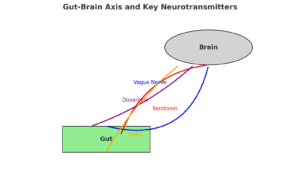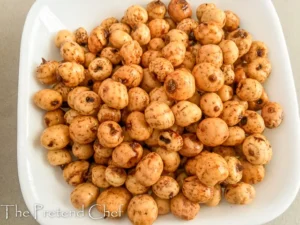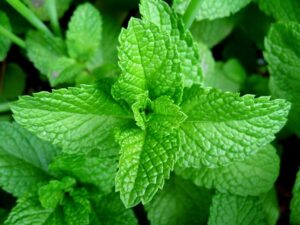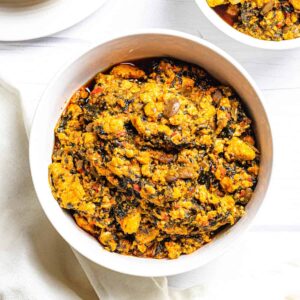Introduction
“Let food be thy medicine and medicine be thy food.” — Hippocrates
Are you seeking a natural approach to managing your mental health? Look no further than the powerful connection between nutrition and mental well-being.
In this blog, we explore how Nigerian nutrient-dense foods can become a delicious tool in your journey towards managing anxiety and depression.
Nutrition plays a crucial role in overall health, and an emerging area of interest is the impact of specific cultural cuisines on our mental well-being.
Nigerian cuisine, with its unique blend of spices, grains, and superfoods, offers many benefits for those seeking to nurture their mental health through diet. This blog will delve into the gut-brain connection, highlighting how our food influences our mood, cognition, and behavior.
We will uncover the traditional Nigerian diet, its nutrient-rich profile, and how it can support individuals experiencing anxiety and depression.
By the end of this article, you will have a deeper understanding of the science behind food-based approaches to mental health and practical tips for incorporating Nigerian nutrient-dense foods into your daily routine.
So, grab a cup of tea, perhaps infused with ginger and turmeric, and let’s embark on a journey towards empowering ourselves and others to take control of mental health through the power of Nigerian cuisine.
The Gut-Brain Axis: A Two-Way Street
The gut-brain axis is a fascinating bidirectional communication system between our gastrointestinal tract and our brain. This connection allows our gut microbiota to influence our mental health and explains why certain foods can impact our mood, cognition, and behavior.
The Microbiome’s Impact
Our gut is home to trillions of microorganisms, collectively known as the microbiome. These microbes influence the production and regulation of neurotransmitters, such as serotonin and dopamine, which play a crucial role in mood and cognitive function.
An imbalanced microbiome can lead to inflammation and altered neurotransmitter function, contributing to anxiety and depression.

The Gut-Brain Axis: Understanding the Connection
Probiotics and Prebiotics to the Rescue
Probiotics and prebiotics can help maintain a healthy gut microbiome. Probiotics are live microorganisms that, when consumed, provide benefits to the host. Common probiotics include certain strains of bacteria, such as lactobacillus and bifidobacterium, found in fermented foods like yogurt and kefir.
Prebiotics are types of fiber that act as food for probiotics, promoting their growth and activity.
Nigerian cuisine offers a variety of probiotic-rich foods, including fermented corn, millet, and sorghum porridges, as well as soy-based dishes like ogiri and iru, which are similar to miso paste.
Incorporating these foods can help support a healthy gut-brain axis.
Nutrient Deficiencies and Mental Health Disorders
Research has linked nutrient deficiencies to an increased risk of anxiety and depression. Let’s explore some common nutrient deficiencies and how the Nigerian diet can help address them.
Key Nutrients for Mental Health
– B Vitamins: Deficiencies in B vitamins, such as folate (B9) and cobalamin (B12), have been associated with depression. Nigerian foods rich in B vitamins include leafy greens, beans, and plantains.
– Omega-3 Fatty Acids: These essential fats are crucial for brain health and mood regulation. A lack of omega-3s has been linked to depression and anxiety. Nigerian sources include fish, sardines, mackerel, and plant-based options like flaxseeds and walnuts.
– Magnesium: Magnesium is involved in regulating neurotransmitters and reducing stress responses. Low magnesium levels have been observed in individuals with anxiety and depression. Millet and sorghum, staples in the Nigerian diet, are excellent sources of magnesium.
| Nutrient | Importance | Nigerian Foods |
|---|---|---|
| B Vitamins | Deficiencies in B vitamins, such as folate (B9) and cobalamin (B12), have been associated with depression. | Leafy greens, beans, plantains |
| Omega-3 Fatty Acids | These essential fats are crucial for brain health and mood regulation. A lack of omega-3s has been linked to depression and anxiety. | Fish, sardines, mackerel, flaxseeds, walnuts |
| Magnesium | Magnesium is involved in regulating neurotransmitters and reducing stress responses. Low magnesium levels have been observed in individuals with anxiety and depression. | Millet, sorghum |
Nigerian Nutrient Powerhouses: Addressing Common Deficiencies
Optimizing the Nigerian Diet
While the Nigerian diet offers a wealth of nutrients, it’s important to note that certain critical nutrients may be lacking due to cultural or regional influences. For example, the traditional Nigerian diet may be lower in vitamin D and certain amino acids, which are important for mental health.
The Power of Anti-Inflammatory Foods
Chronic inflammation is a common thread in many mental health disorders. Inflammatory processes in the brain can impact neurotransmitter function and have been linked to depression and anxiety. Nigerian cuisine boasts an array of potent anti-inflammatory spices and foods that can help combat this inflammation.
Nature’s Anti-Inflammatories
– Turmeric: This golden spice, commonly used in Nigerian dishes, contains curcumin, a powerful compound with anti-inflammatory and antioxidant properties.
– Ginger: Gingerol, the active compound in ginger, gives this spice its anti-inflammatory benefits.
– Leafy Greens: Nigerian dishes often include leafy greens such as spinach and bitter leaf, which are rich in antioxidants and have anti-inflammatory effects.

A Plate of Anti-Inflammatory Power: Nigerian Cuisine at its Finest
Reducing Inflammation, Enhancing Mental Wellbeing
By incorporating more anti-inflammatory foods into your diet, you may notice improvements in your mental health. These foods can help reduce overall inflammation in the body, including the brain, leading to potential improvements in mood and cognitive function.
Traditional Nigerian Diet: A Treasure Trove of Nutrients
The traditional Nigerian diet is a cornucopia of nutrient-dense superfoods, offering a unique blend of health benefits.
Nigerian Superfoods
– Millet: Millet is a gluten-free grain rich in magnesium, B vitamins, and fiber. It has a low glycemic index, helping to stabilize blood sugar levels and providing sustained energy.
– Sorghum: Another gluten-free grain, sorghum is packed with antioxidants, fiber, and essential amino acids. It’s also a good source of vitamins B and E.
– Plantains: Green plantains are a staple in Nigeria, providing resistant starch, which acts as a prebiotic and supports gut health. They are also a good source of potassium and vitamin C.
Top 5 Nigerian Superfoods to Boost Your Mental Wellbeing
1. Ugu (Fluted Pumpkin Leaves)

Ugu leaves are rich in vitamins A, C, and E, and contain high levels of antioxidants. These nutrients help to reduce stress and improve brain function.
2. Ofada Rice

Ofada rice is an unpolished brown rice variety native to Nigeria. It’s packed with fiber, magnesium, and essential amino acids, which support overall brain health and reduce anxiety.
3. Tigernuts (Aya)

Tigernuts are a great source of prebiotic fiber, which promotes gut health and, in turn, affects mental health positively. They are also rich in vitamin E and magnesium.
4. Bitter Leaf (Vernonia Amygdalina)

Bitter leaf contains compounds that help to detoxify the body and improve liver function, which is crucial for mental clarity and focus. It’s also rich in vitamins and minerals.
5. Scent Leaf (Ocimum Gratissimum)

Scent leaf is known for its calming effects and is used in traditional medicine to treat anxiety and insomnia. It contains essential oils and compounds that promote relaxation and mental wellbeing.
Exploring the Nigerian Pantry
Stocking your pantry with Nigerian staple foods can be a great way to support your mental health journey. Grains like millet and sorghum, legumes such as beans and peas, and healthy fats like palm oil and shea butter form the foundation of many Nigerian dishes.
Brain-Boosting Nigerian Dishes
Nigerian cuisine offers an array of delicious dishes that are rich in brain-healthy nutrients.
Jollof Rice
A popular West African dish, jollof rice, is a flavorful blend of rice, tomatoes, and spices. It’s a good source of lycopene, an antioxidant with potential cognitive benefits.
Egusi Soup
Egusi soup is made with melon seeds, leafy greens, and spices, providing healthy fats and antioxidants. The soup is often served with starchy vegetables like yams or plantains, adding complex carbohydrates for sustained energy.
Moi-Moi
Moi-moi is a savory steamed bean cake, similar to a vegetarian pudding, made with beans, onions, and spices. It’s an excellent source of plant-based protein and B vitamins.
Adaptogenic Herbs in Nigerian Cuisine
Adaptogenic herbs, used in Nigerian traditional medicine, can provide additional support for anxiety and depression.
Nature’s Balancers
- Ashwagandha Ashwagandha and Lion’s Mane Mushroom: Ancient Herbs for Modern Wellbeing“`.
Ashwagandha, a revered adaptogen in Ayurvedic medicine, has been used for centuries to promote relaxation and reduce stress levels. It helps regulate cortisol, improves mood, and boosts energy. Lion’s mane mushroom, a cognitive superstar, enhances focus, elevates mood, supports nerve regeneration, and reduces brain inflammation.
Incorporating Adaptogens
Adaptogenic herbs can be incorporated into your daily routine in various forms, including tinctures, powders, capsules, teas, and smoothies. They can also be added to meals for a functional boost. When using adaptogens, it’s important to source them from reputable suppliers and follow recommended dosages for optimal benefits.
Practical Tips for Embracing Nigerian Nutrient-Dense Foods
The knowledge of Nigerian nutrient-dense foods is powerful, but how do you bring it into your daily life? This section will dive into practical tips for incorporating these foods into your meals and routines.
Stocking Your Nigerian Pantry
Creating delicious and nutritious Nigerian meals starts with a well-stocked pantry. Here are the essential items to have on hand:
- Grains: Millet, sorghum, brown rice, quinoa, and oats form the basis of many Nigerian dishes.
- Legumes: Beans, peas, chickpeas, and lentils provide plant-based protein and fiber.
- Healthy Fats: Palm oil, shea butter, avocado oil, and nuts offer essential fatty acids and add flavor.
- Spices: Turmeric, ginger, cayenne pepper, and cinnamon bring vibrant flavors and anti-inflammatory benefits.
- Superfoods: Leafy greens, flaxseeds, and walnuts are nutrient powerhouses.
Delicious Meal Ideas and Recipes
Experiment with these tasty and nourishing Nigerian dishes:
- Breakfast: Try a twist on oatmeal by cooking millet or sorghum porridge. Top with sliced bananas, a sprinkle of cinnamon, and a drizzle of honey.
- Lunch: Create a hearty salad with leafy greens, roasted plantains, beans, avocado, and a tangy lemon dressing.
- Dinner: Jollof rice with steamed vegetables or egusi soup with yam and plantain for a flavorful and nutritious meal.
- Snacks: Moi-moi bean cakes, spiced nuts, or fruit with nut butter dip are satisfying options.
Dining Out and Grocery Shopping Hacks
When dining out, opt for Nigerian or African restaurants to explore authentic flavors. Don’t be afraid to ask for recommendations on nutrient-dense dishes and modifications to suit your taste and health goals.
For grocery shopping, explore international aisles or specialty stores for Nigerian ingredients. Online retailers and health food stores are also excellent sources of unique items.
Conclusion: Nurturing Mind and Body with Nigerian Cuisine
Incorporating Nigerian nutrient-dense foods into your diet is an empowering step towards supporting your mental health journey. The gut-brain axis highlights how our dietary choices profoundly impact our mental wellbeing, and Nigerian cuisine offers a treasure trove of nutrients to nurture and balance your mind and body.
By understanding the power of specific nutrients, anti-inflammatory foods, and adaptogenic herbs, you can create delicious meals that satisfy your taste buds and boost your mood, focus, and resilience.
Embrace the richness of Nigerian cuisine, experiment with new ingredients, and discover the healing power of food. How will you include these delicious and nourishing foods in your routine?
FAQs
Q: What are simple ways to include more Nigerian nutrient-dense foods in my diet?
A: Start with small changes. Incorporate millet or sorghum into your breakfast porridge or as a side dish. Add leafy greens and plantains to your meals, and spice things up with turmeric and ginger.
Q: Are there potential side effects or precautions with these foods?
A: Always listen to your body. Introduce new foods gradually and consult a healthcare professional if you have concerns or underlying health conditions.
Q: How soon can I expect improvements in my mental health?
A: Results vary. Some may experience improved mood and energy within weeks, while for others, it may take longer. Consistency and a holistic approach are key.
Q: Are there specific Nigerian foods or spices beneficial for anxiety?
A: Yes, adaptogenic herbs like ashwagandha and lion’s mane mushroom help reduce stress and improve mood. Turmeric and ginger, common in Nigerian dishes, also have anxiolytic properties.
Q: Where can I find recipes and resources for Nigerian nutrient-dense meals?
A: Explore websites, blogs, YouTube channels, and follow Nigerian food influencers for recipe inspiration and tips.
Further Reading and References
- “The Gut-Brain Connection,” Harvard Health Publishing, https://www.health.harvard.edu/mind-and-mood/the-gut-brain-connection
- “Nutrition and Mental Health,” National Alliance on Mental Illness, https://www.nami.org/About-Mental-Illness/Mental-Health-Conditions/Related-Conditions/Nutrition-Mental-Health
- “The Gut-Brain Axis: How Probiotics and Prebiotics Affect Mental Health,” Psychology Today, https://www.psychologytoday.com/us/blog/the-athletes-way/202001/the-gut-brain-axis-how-probiotics-and-prebiotics-can-impact-your-mental




